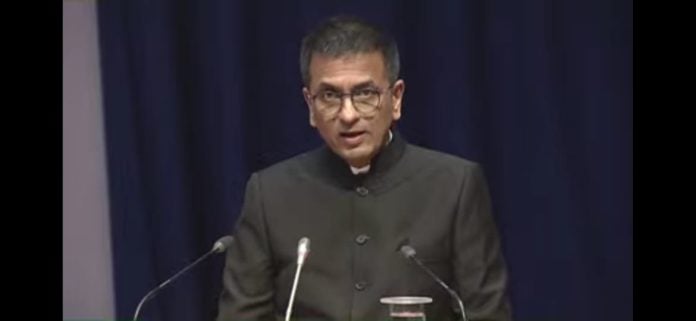Chief Justice of India (CJI) D.Y. Chandrachud on Wednesday said that fake news had the capability of creating tensions between communities, thereby endangering democratic values of fraternity.
Giving his keynote speech during the 16th edition of Ramnath Goenka Awards for Excellence in Journalism as Chief Guest, the CJI saidthe press must remain free, if the country has to remain a democracy.
He said India has a wide variety of newspapers and before independence newspapers were run by social workers to make people aware of their rights. Newspapers of that era also gave us a detailed picture of that time.
As per the CJI, the vibrancy of democracy was compromised when the press was prevented from speaking truth to power. The press must remain free if the country has to remain a democracy. Newspapers have historically acted as catalysts for social and political change, he observed.
As per the CJI, media voiced the aspiration of the soul as many journalists worked in difficult conditions, but never compromised on work ethics.
He said the citizens may not agree with the process adopted by the journalists, but this disagreement could not take the shape of violence.
He further said that responsible journalism was the engine that drove democracy forward to a better tomorrow. In a digital age, it was more important than ever for journalists to be accurate, impartial, responsible and fearless in their reporting.
Talking about his own experience, the CJI shared that the Apex Court has held that journalism will survive till it can question truth to power.
He recalled that he was taking a flight to the US in 1982 to pursue LLM and that was the day of the launch of colour TVs.
He said Emergency was a fearful time, but it also gave rise to fearless journalism. The government of the day had tried to corner Indian Express in every which way in the 1980s. They were served showcause notices and it was just not the police who hounded them in their quest for freedom.
The CJI said he was 16 when the emergency was declared and the blank Indian Express editorial reminded the citizens that silence can be as strong as speech.
He said in the recent past, social media has given a new platform to journalists and led to democratisation of media. Years ago, there was paucity of space for journalists and now there was paucity of readers’ attention span and it has gone down in times of social media.
This was, however, no replacement for investigative reporting and was a challenge for scribes to penetrate the echo chambers created by social media, he added.
CJI Chandrachud underlined the need to bridge the gap between truth and lie.
The CJI said in recent years, the media was witnessing rising interest in legal journalism and was becoming a storyteller.
However, selective quoting of judges have a tendency to distort public understanding of the judicial system and was a concern for judges. It was essential for journalists to give a complete picture of the event and report accurately and factually.
Talking about the relationship between law and journalism, he said that people from both professions believed that pen was mightier than the sword and also bear the professional hazard of not being liked by people.
The CJI in a lighter vein said that his judicial clerk told him that he has been added to the list, where he should not scroll down Twitter.
At the very outset, the CJI congratulated all the winners. He said that he was browsing through the award categories and was very impressed by the depth and breadth of reportage especially in the language medium. Those who could not win, have still won, he observed.


